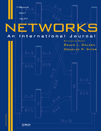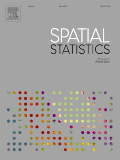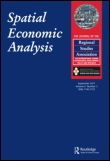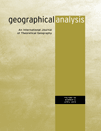
NETWORKS & SPATIAL ECONOMICS
Scope & Guideline
Innovating Insights in Spatial Economics and Network Theory
Introduction
Aims and Scopes
- Spatial Optimization and Network Design:
Research in this area includes optimization models for facility location, transportation networks, and urban planning that consider spatial constraints and economic efficiency. - Dynamic and Stochastic Modeling:
This encompasses studies that utilize stochastic programming and dynamic models to address uncertainties in demand, supply, and travel behaviors, reflecting real-world complexities. - Game Theory and Strategic Interactions:
The journal features papers that apply game-theoretic approaches to analyze competitive behaviors in networked environments, such as transportation and logistics. - Agent-Based and Simulation Models:
Research that employs agent-based modeling to capture individual behaviors and interactions within spatial economic frameworks is a key focus, providing insights into emergent phenomena. - Resilience and Vulnerability Analysis:
Papers addressing the resilience of networks and systems to shocks, as well as their vulnerability, particularly in the context of crises and natural disasters, are prominently featured. - Multi-Modal Transport Systems:
Studies exploring the integration and optimization of various transport modes, including public transit and private vehicle interactions, are essential to the journal's scope.
Trending and Emerging
- Sustainability and Green Logistics:
Increasing attention is being paid to sustainable transport solutions and green logistics, particularly in the context of electric vehicles and eco-friendly facility design. - Impact of Technology on Mobility:
Research focusing on the implications of new technologies, such as autonomous vehicles and smart transportation systems, is gaining traction, emphasizing their transformative effects on spatial economics. - COVID-19 and its Economic Impacts:
The ongoing analysis of the pandemic's influence on travel behavior, transport networks, and urban mobility patterns has become a significant area of interest, providing insights into resilience strategies. - Data-Driven Decision Making:
There is a rising trend in utilizing big data and advanced analytics in network modeling, allowing for more informed decision-making in urban planning and transportation. - Collaborative Consumption and Shared Mobility:
Emerging themes around shared mobility solutions and collaborative consumption models are increasingly being explored, reflecting changing consumer behaviors and preferences in urban settings.
Declining or Waning
- Traditional Economic Models without Spatial Considerations:
The journal has seen a decrease in papers that utilize classical economic models that do not incorporate spatial dimensions, as researchers increasingly recognize the importance of spatial interactions. - Static Facility Location Models:
There has been a waning interest in purely static models for facility location, with a shift towards more dynamic and responsive approaches that consider changing conditions and uncertainties. - Purely Theoretical Research:
Research that is primarily theoretical without empirical applications or simulations has seen reduced publication frequency, as the journal emphasizes practical implications and real-world applications. - Generalized Network Analysis:
While still relevant, the broad category of generalized network analysis has become less prominent as the focus narrows to specific applications in transportation and urban systems. - Single-Dimensional Transportation Studies:
There is a noticeable decline in studies that examine transportation issues from a singular perspective, as multidimensional approaches that integrate various factors are becoming more favored.
Similar Journals

NETWORKS
Driving the Future of Communication and Network ArchitectureNETWORKS, an esteemed journal published by Wiley, serves as a premier platform for the dissemination of high-quality research in the fields of computer networks, communications, hardware architecture, and information systems. With an ISSN of 0028-3045 and an E-ISSN of 1097-0037, the journal has been at the forefront of networking studies since its inception in 1971 and continues to thrive, boasting a convergence period that extends into 2024. Recognized for its rigorous peer-review process, NETWORKS is placed in the Q1 and Q2 quartiles of various categories, underscoring its significant impact and relevance in the realm of computer science. Although there is no open access option currently available, the journal remains a vital resource for researchers, professionals, and students who seek to navigate the evolving landscapes of technology and innovation. With its robust Scopus rankings and a growing readership, NETWORKS is dedicated to fostering advancements in network theory and practice, making it an essential read for those at the cutting edge of this dynamic field.

Spatial Statistics
Innovative Insights for a Changing WorldSpatial Statistics is a premier journal published by ELSEVIER SCI LTD, focusing on innovative methodologies and applications in the realm of statistical analysis within spatial contexts. With an ISSN of 2211-6753, the journal has established itself as a significant contributor in its field since its inception in 2012, and continues to thrive, with its next volume projected through 2024. It holds a respectable Q2 ranking across several categories, including Computers in Earth Sciences, Management, Monitoring, Policy and Law, and Statistics and Probability, affirming its impact and relevance to researchers and professionals alike. The journal's commitment to publishing high-quality research enables scientists to advance understanding of spatial phenomena, facilitating informed decision-making in various applications ranging from environmental science to urban planning. As part of a robust academic community, Spatial Statistics invites submissions that push the boundaries of conventional statistical techniques, ensuring that the latest findings contribute significantly to the discipline's body of knowledge.

Spatial Economic Analysis
Navigating the Complexities of Spatial EconomicsSpatial Economic Analysis, published by Routledge Journals, Taylor & Francis Ltd, stands at the forefront of interdisciplinary research bridging economics, geography, and environmental science. With a notable impact factor reflected in its prestigious Q1 quartile rankings across key categories such as Earth and Planetary Sciences, Economics, Econometrics and Finance, and Geography, this journal is pivotal for scholars seeking to understand the intricate dynamics of spatial phenomena and their economic implications. Its comprehensive scope and rigorous peer-review process ensure that only high-quality research is disseminated, fostering innovative solutions to pressing global challenges. As of 2024, and since its inception in 2006, Spatial Economic Analysis continues to thrive as a vital platform for researchers, professionals, and students alike, facilitating access to cutting-edge studies that shape the future of spatial economics and policy.

Theoretical Economics
Pioneering Insights in Theoretical EconomicsTheoretical Economics, published by the Econometric Society, is a premier open-access journal dedicated to advancing the field of economics through rigorous theoretical analysis. With an ISSN of 1933-6837 and an E-ISSN of 1555-7561, this journal has been at the forefront of economic scholarship since its inception. Operating out of New York University, it holds a prestigious Q1 ranking in the category of Economics, Econometrics, and Finance, reflecting its influential contributions to the discipline. By making research freely accessible since 2006, Theoretical Economics not only fosters a broader dissemination of knowledge but also promotes collaborative dialogue among economists worldwide. The journal's convergence years span from 2007 to 2024, ensuring ongoing relevance in a rapidly evolving field. Researchers, professionals, and students alike will find Theoretical Economics an essential resource for staying informed about cutting-edge theoretical advancements in economics.

Applied Network Science
Exploring the frontiers of computational mathematics and networks.Applied Network Science is a premier open access journal published by SpringerNature that has been a vital resource in the fields of computational mathematics and computer networks since its inception in 2016. With an impressive Q1 ranking in Multidisciplinary fields and Q2 rankings in both Computational Mathematics and Computer Networks and Communications, it distinguishes itself as a significant contributor to interdisciplinary research efforts. The journal fosters innovative methodologies and applications within network science, making it a crucial platform for researchers, professionals, and students alike. With an E-ISSN of 2364-8228 and a commendable standing in global rankings, it supports a broad audience through its commitment to open access, ensuring that groundbreaking research is readily available. Located in Switzerland, Applied Network Science continues to shape the landscape of network research and communication, making substantial impacts across various domains.

PAPERS IN REGIONAL SCIENCE
Shaping the future of regional development through research.PAPERS IN REGIONAL SCIENCE, published by Wiley, is a leading international journal dedicated to advancing the understanding of regional science and interdisciplinary approaches to geography and environmental planning. With an impressive impact factor and a prestigious Q1 ranking in both Environmental Science and Geography, Planning and Development, this journal serves as a critical platform for disseminating high-quality research from 1955 to 2024. Covering a diverse scope including regional development, spatial analysis, and environmental issues, it facilitates discussion and knowledge exchange among scholars and practitioners. The journal is recognized for its rigorous peer-review process and its commitment to addressing pressing societal challenges through research. As a vital resource for researchers, professionals, and students alike, PAPERS IN REGIONAL SCIENCE fosters innovation and collaboration within the field, contributing to a deeper understanding of the complexities of regional systems.

GEOGRAPHICAL ANALYSIS
Advancing Knowledge in Geography and PlanningGEOGRAPHICAL ANALYSIS, published by WILEY, is a premier scholarly journal that has been at the forefront of geographical and earth-surface research since its inception in 1969. With an ISSN of 0016-7363 and an E-ISSN of 1538-4632, this journal has established itself as an essential resource for researchers and professionals in the fields of Earth-Surface Processes and Geography, Planning and Development, achieving impressive rankings of 13th and 60th in their respective categories according to Scopus, placing it in the Q1 quartile for both. The journal is renowned for its rigorous peer-reviewed articles that contribute valuable insights into spatial analysis, environmental impacts, and urban planning, thus fostering a deeper understanding of geographical phenomena. With access options available through traditional subscriptions, GEOGRAPHICAL ANALYSIS continues to serve as a critical platform for the dissemination of cutting-edge research and innovative methodologies, ultimately shaping the future of geographical inquiry and application.

TIJDSCHRIFT VOOR ECONOMISCHE EN SOCIALE GEOGRAFIE
Exploring the Nexus of Economics and Social GeographyTIJDSCHRIFT VOOR ECONOMISCHE EN SOCIALE GEOGRAFIE, an esteemed journal published by WILEY, provides a premier platform for the dissemination of cutting-edge research within the fields of economics and social geography. With an ISSN of 0040-747X and an E-ISSN of 1467-9663, this journal has established itself as a pivotal resource, exhibiting a remarkable Q1 ranking in both Economics and Econometrics as well as Geography, Planning and Development for 2023. Notably, it is positioned in the 95th percentile among 821 journals in its category of Social Sciences, and ranks 46th among 716 in Economics and Econometrics, underscoring its influential role in shaping academic discourse. The journal, which has been in publication since 1967 and is anticipated to run through 2024, invites contributions that explore the intricate interplay between economic phenomena and social geospatial dynamics. Researchers, professionals, and students are encouraged to engage with its findings, which are crucial for understanding contemporary socio-economic challenges and innovations on a global scale.

Revue d Economie Regionale et Urbaine
Driving innovation in regional economic research.Revue d Economie Regionale et Urbaine is a prestigious journal published by ARMAND COLIN, dedicated to advancing the field of regional and urban economics. Renowned for its rigorous peer-reviewed articles, this journal provides a vital platform for scholars, practitioners, and students to explore contemporary issues, methodologies, and case studies in regional development, urban policy, and economic geography. With its ISSN 0180-7307 and E-ISSN 2107-0865, the journal facilitates widespread dissemination of knowledge, although it currently does not offer open access options. Situated in Paris, France, Revue d Economie Regionale et Urbaine plays a critical role in fostering dialogue and innovation among academics and policymakers alike, contributing significantly to the understanding and enhancement of urban and regional economies.

Computational Economics
Transforming Economic Analysis through Computational Methods.Computational Economics is a premier journal dedicated to advancing the interdisciplinary field that bridges computational methods and economic theory. Published by Springer in the Netherlands, this journal serves as a critical platform for researchers and practitioners from economics, econometrics, and computer science, fostering innovation and cross-pollination of ideas from 1993 to 2024. With a notable impact factor in its categories—ranking Q2 in Economics, Econometrics, and Finance and Q3 in Computer Science Applications—Computational Economics consistently delivers rigorous peer-reviewed research that addresses contemporary challenges in economic modeling and computational techniques, making it an indispensable resource for the academic community. The journal provides a range of access options and is indexed in Scopus, where it holds a strong position in the 78th percentile of its category, ensuring high visibility and engagement for published works. Researchers, students, and professionals will find valuable insights across its diverse scope, facilitating the exploration of new methodologies that shape the future of economic analysis.